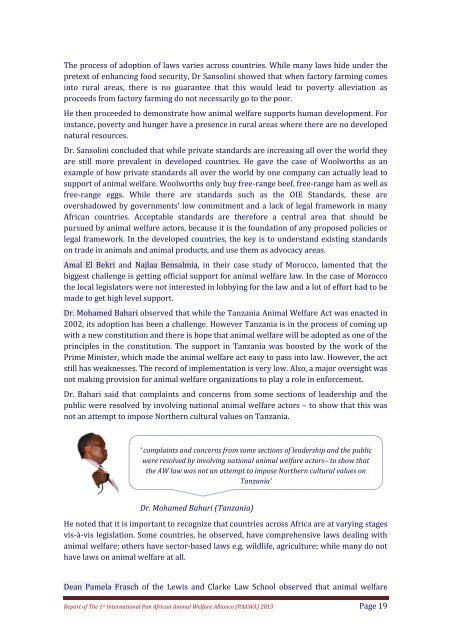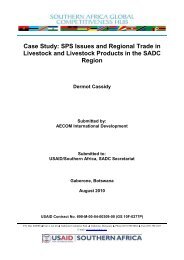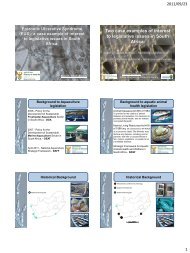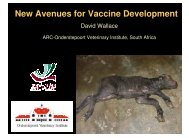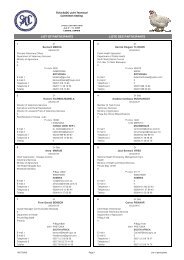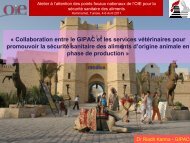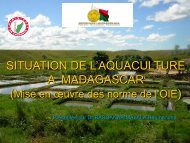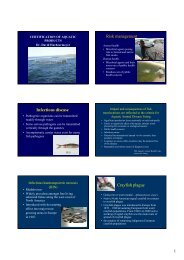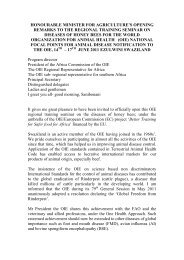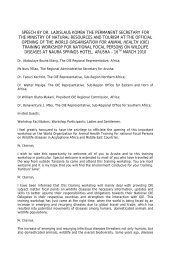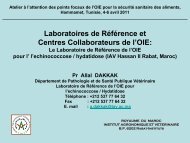1st INTERNATIONAL PAN AFRICAN ANIMAL WELFARE ALLIANCE ...
1st INTERNATIONAL PAN AFRICAN ANIMAL WELFARE ALLIANCE ...
1st INTERNATIONAL PAN AFRICAN ANIMAL WELFARE ALLIANCE ...
Create successful ePaper yourself
Turn your PDF publications into a flip-book with our unique Google optimized e-Paper software.
The process of adoption of laws varies across countries. While many laws hide under thepretext of enhancing food security, Dr Sansolini showed that when factory farming comesinto rural areas, there is no guarantee that this would lead to poverty alleviation asproceeds from factory farming do not necessarily go to the poor.He then proceeded to demonstrate how animal welfare supports human development. Forinstance, poverty and hunger have a presence in rural areas where there are no developednatural resources.Dr. Sansolini concluded that while private standards are increasing all over the world theyare still more prevalent in developed countries. He gave the case of Woolworths as anexample of how private standards all over the world by one company can actually lead tosupport of animal welfare. Woolworths only buy free-range beef, free-range ham as well asfree-range eggs. While there are standards such as the OIE Standards, these areovershadowed by governments’ low commitment and a lack of legal framework in manyAfrican countries. Acceptable standards are therefore a central area that should bepursued by animal welfare actors, because it is the foundation of any proposed policies orlegal framework. In the developed countries, the key is to understand existing standardson trade in animals and animal products, and use them as advocacy areas.Amal El Bekri and Najlaa Bensalmia, in their case study of Morocco, lamented that thebiggest challenge is getting official support for animal welfare law. In the case of Moroccothe local legislators were not interested in lobbying for the law and a lot of effort had to bemade to get high level support.Dr. Mohamed Bahari observed that while the Tanzania Animal Welfare Act was enacted in2002, its adoption has been a challenge. However Tanzania is in the process of coming upwith a new constitution and there is hope that animal welfare will be adopted as one of theprinciples in the constitution. The support in Tanzania was boosted by the work of thePrime Minister, which made the animal welfare act easy to pass into law. However, the actstill has weaknesses. The record of implementation is very low. Also, a major oversight wasnot making provision for animal welfare organizations to play a role in enforcement.Dr. Bahari said that complaints and concerns from some sections of leadership and thepublic were resolved by involving national animal welfare actors – to show that this wasnot an attempt to impose Northern cultural values on Tanzania.‘ complaints and concerns from some sections of leadership and the publicwere resolved by involving national animal welfare actors– to show thatthe AW law was not an attempt to impose Northern cultural values onTanzania’Dr. Mohamed Bahari (Tanzania)He noted that it is important to recognize that countries across Africa are at varying stagesvis-à-vis legislation. Some countries, he observed, have comprehensive laws dealing withanimal welfare; others have sector-based laws e.g. wildlife, agriculture; while many do nothave laws on animal welfare at all.Dean Pamela Frasch of the Lewis and Clarke Law School observed that animal welfareReport of The 1 st International Pan African Animal Welfare Alliance (PAAWA) 2013 Page 19


